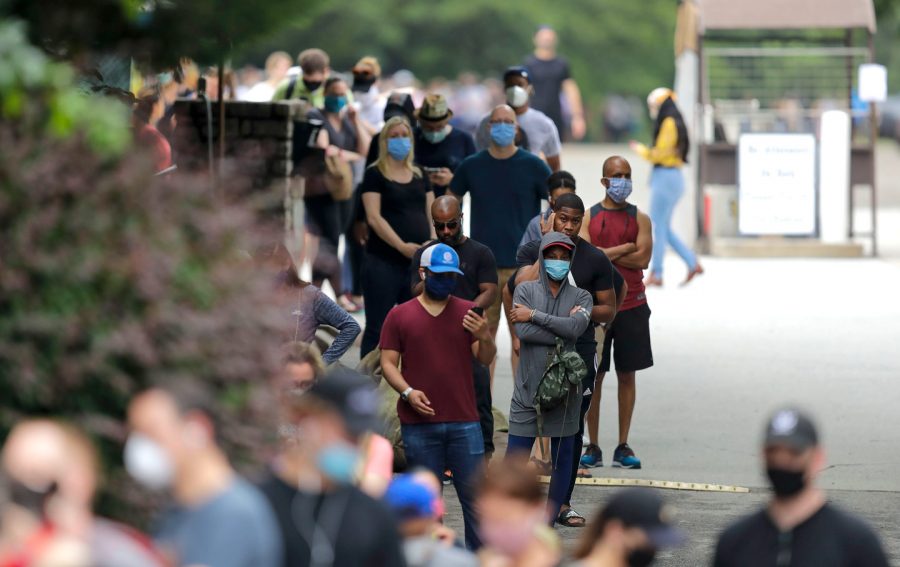Presidential election exposes local and national voting suppression
Photo credit The Nation
Voters in Georgia wait in extensive lines to cast polls.
With more people voting via mail-in ballots than ever before, voting and voter suppression have been important topics in the 2020 election. The Constitution enumerates voting as a right given to any American citizen over the age of 18, regardless of sex, religion, disability, or orientation. However, voter suppression illegally restricts one’s ability to vote or register to vote on the basis of one’s racial identity, political party, or religious affiliation.
When the founding fathers passed the Constitution in 1776, only white males who owned property and were over the age of 21 could vote. In fact, when George Washington assumed the role of president, only 6 percent of the population could vote.
In 1870, Congress ratified the 15th Amendment, which gave African American men the right to vote. Nonetheless, many states took discriminatory measures to restrict African Americans’ ability to vote, including through literacy tests, voting taxes, violence, and intimidation tactics at the polls.
One of the most well-known allegations of voter suppression occurred during the 2018 gubernatorial election in Georgia between Stacey Abrams and Brian Kemp. According to the Atlanta Journal Constitution, election officials purged, or removed, more than 85,000 voters in the three months leading up to the elections. In 2017, 668,000 voters faced purging, many of whom were minorities.
“[Voter suppression] definitely happened during the Georgia gubernatorial elections, where places of certain diversity, specifically for black voters in the city of Atlanta, had a lot less ballot boxes and ability to vote which made the lines incredibly long,” said senior Lily Fleischmann, a leader of Young Democrats.
However, others allege that voter suppression happens due to the actions of individual political groups. President Donald Trump himself filed three lawsuits in three different states claiming voter fraud.
According to Fox News, the political group known as Antifa, a left-wing political group, had been threatening attacks on large cities, to try to intimidate right-leaning voters. The FBI also investigated a chain of threatening emails sent by a group claiming to be affiliated with the Proud Boys, a far-right group that has been accused of neo-fascism and white supremacy. Later, the leader of the Proud Boys, Enrique Tarrio, denied any involvement.
“I do believe there are groups of people who go out of their way to interfere with ballots, mailed-in ballots,” said Manuela Kelly, a faculty advisor for the Young Conservatives club.
These opposing opinions have sparked many debates about the reliability of mailed-in ballots. In recent weeks, President Donald Trump has made numerous claims that mail-in ballots are fraudulent.
“It’s very important to vote in person,” said Kelly. “There are groups out there
who can intercept mailed-in ballots.”
Contrarily, some argue that in-person voting is rife with voter suppression. Eric Khong, an English teacher and poll volunteer, said that he saw voter suppression at the polls while he was volunteering there during the 2018 election midterms.
“Some of the examples of voter suppression were the long lines, the machines that were either mysteriously down or not present at the beginning of the polling times, and systems being down for some counties but not for others,” said Khong.
These technical difficulties often impact minority, low-income communities, which makes the voting process more inconvenient and difficult to navigate.
“[Georgia] is one of only a few states that requires strict photo ID laws in which you must present a photo ID belonging to a small assortment of government approved forms of verification.” said Lucy Hager, one of the presidents of the Young Democrats club. “This can be really harmful to Georgia’s most underserved voter population who might not have the monetary or temporal means to acquire a drivers license, student ID, or passport.”
However, voter suppression is much more complex than it seems. Debates around such measures often center around controversy over whether a matter is voter suppression or simply an extra precaution.
“ID laws, which many people feel is an act of voter suppression, has a different side to it as well,” said Ellen Vesey, a math teacher and poll worker. “One can also see [these laws] as a way to make the election process clean and error-free.”
While some members of the Westminster community agree that these additional factors can make voting a demoralizing experience, others share stories of hope and persistence.
“People need to think that voting is so important that they are willing to stand two and a half hours, like I did, to make that vote,” said Kelly. “I understand there are people for whom physical or medical reasons prevent them from going. If you are able-bodied, and standing in line during Black Friday and at Christmas time is an accepted norm, then I suppose you can also stand in line to vote.”
Ultimately, each citizen has the constitutional right to vote, and every voice counts in the process of selecting this nation’s leaders.
“I persisted and didn’t just walk away. I made sure my vote counted and the poll workers were on my side and helped make that happen, which I am very grateful for,” said Hager.





